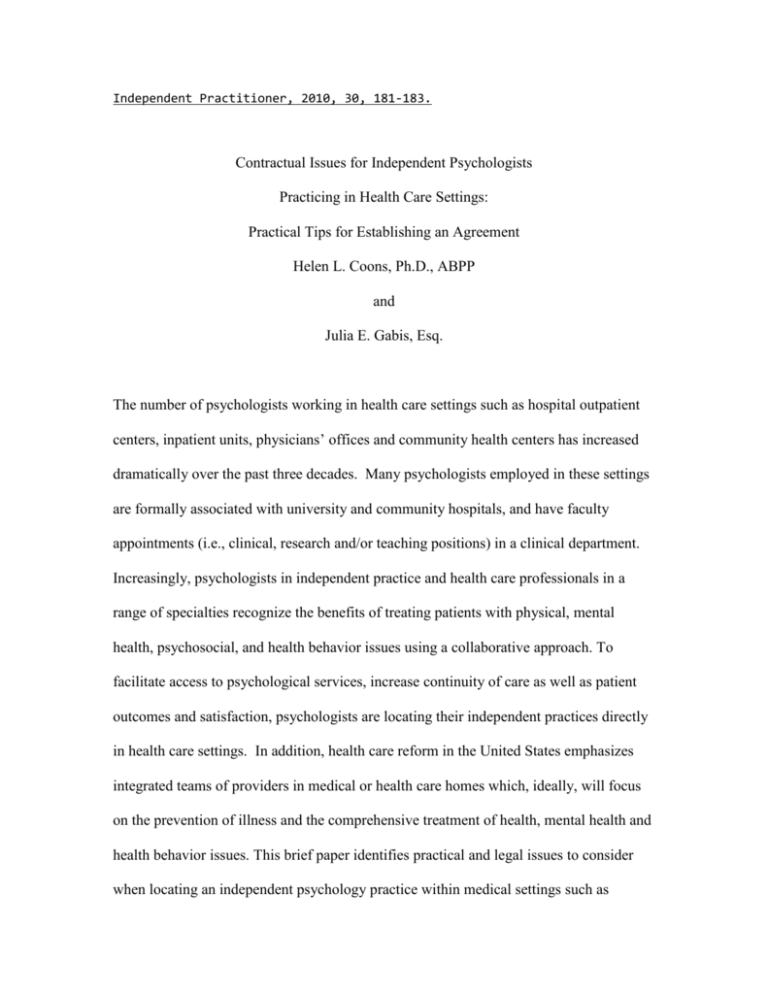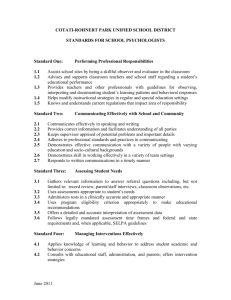
Independent Practitioner, 2010, 30, 181-183.
Contractual Issues for Independent Psychologists
Practicing in Health Care Settings:
Practical Tips for Establishing an Agreement
Helen L. Coons, Ph.D., ABPP
and
Julia E. Gabis, Esq.
The number of psychologists working in health care settings such as hospital outpatient
centers, inpatient units, physicians’ offices and community health centers has increased
dramatically over the past three decades. Many psychologists employed in these settings
are formally associated with university and community hospitals, and have faculty
appointments (i.e., clinical, research and/or teaching positions) in a clinical department.
Increasingly, psychologists in independent practice and health care professionals in a
range of specialties recognize the benefits of treating patients with physical, mental
health, psychosocial, and health behavior issues using a collaborative approach. To
facilitate access to psychological services, increase continuity of care as well as patient
outcomes and satisfaction, psychologists are locating their independent practices directly
in health care settings. In addition, health care reform in the United States emphasizes
integrated teams of providers in medical or health care homes which, ideally, will focus
on the prevention of illness and the comprehensive treatment of health, mental health and
health behavior issues. This brief paper identifies practical and legal issues to consider
when locating an independent psychology practice within medical settings such as
internal medicine, family medicine, pediatrics, obstetrics/gynecology, reproductive
endocrinology, oncology, surgery, physical therapy and dental offices.
To build a successful collaborative relationship, health care providers, their office
staff and the psychologist should identify and clarify their expectations at the outset. The
time spent carefully discussing the terms of a collaborative arrangement will build
communication between and among all the stakeholders, reduce surprises, and foster the
collaborative relationship necessary for the effective care of patients and families. Once
the medical office and the psychologist have reached consensus on the arrangement, a
written agreement should be drafted and signed to confirm the terms of the arrangement.
Both parties are well-advised to obtain legal counsel familiar with health care law and the
particular legal constraints on such arrangements to ensure that the agreement accurately
reflects both the agreed-upon terms and complies with federal and state laws and
regulations.
While the final content of agreements will likely vary, most should address the
following issues: 1) the term of the agreement and grounds for termination: 2) the cost
and schedule for use of the space; 3) patient referrals; 4) insurance coverage(s) and
documentation; 5) confidentiality of patient records and propriety matters; 6) storage and
ownership of patient records; 7) use of office resources; and 8) marketing concerns.
These terms are discussed below.
1) Length of the Agreement and Termination. The agreement between the
medical practice and the psychologist should provide for a specific term -- preferably
at least one (1) year. It should also identify the grounds for ending the agreement during
the term and the mechanism for termination at the end of the term. For example, most
agreements will automatically rollover for an additional term unless one party provides
the other with ninety (90) days written notice prior to the end of the term.
2) Cost and Flexibility with Space. While some physicians and/or other health
professionals may control the cost of the space, in university settings or corporate-owned
practices, the cost will likely be determined by management based on the amount of
space and the number of providers using the space. Most offices are priced on the basis
of a unit cost per session – which in the medical setting is often a four (4) hour block of
time (e.g., 8 am to 12 pm, 1 pm to 5 pm or 5 pm to 9 pm), and by the amount of space to
be leased. Often, rates for space in medical offices are higher for physicians who require
more resources (e.g., receptionist, nurses and medical assistants, exam room supplies, and
support for patient scheduling and billing). In contrast, psychologists typically need only
a consult or exam room to see individuals, couples and/or families; phone access to
contact patients, colleagues, and insurance companies; a copy machine for limited
copying of patient information and materials; access to the internet; and a receptionist to
greet patients. In any event, in order to avoid violating federal and state laws, the cost of
the space should be based on the fair market value of the space and resources to be
utilized, and should not take into account or be based upon the value of any potential
referrals between the parties
Space rental may involve a designated space such as a consultation room that
could change depending on the day as well as the number and types of providers who are
also in the office. Rooms may change when physicians, nurse practitioners or other
providers need to do procedures (e.g., exams, minor surgeries, ultrasounds, EKG’s,
injections, etc.) or nurses, nutritionists, genetic counselors offer patient education, etc. In
other offices, psychologists may just use an exam room to see patients. Flexibility
regarding room use allows the medical office to run more efficiently and to accommodate
health care providers and psychologists with changing schedules. Many patients, couples
and families appreciate seeing a psychologist in a familiar medical office which holds
less stigma than a traditional psychotherapy setting. Other patients, who require
consistency in the therapy environment, may not respond well to being seen in different
rooms. Furthermore, some individuals may not feel comfortable seeing a psychologist
routinely in exam rooms when a consult room is unavailable. Furthermore, if the
psychologist has a strong interest in furnishing or decorating an entire office or is
uncomfortable with the hectic pace of a medical office, locating a practice in another
health care professional’s or organization’s space may not be a good fit. These
considerations should be identified in the negotiation process and addressed through the
agreement.
3) Patient Referrals: The agreement should provide that it is not intended to guarantee
patient referrals and that fee-splitting between the health care provider(s) and the
psychologist is not permitted. Providers may refer patients to any qualified mental health
professional, including other psychologists, psychiatrists or social workers in the same or
outside the office. More likely than not, psychologists in a shared setting will receive
referrals and will be asked to help with outside referrals. Patients often need a referral
within their insurance network if the psychologist is not on their panel; prefer to seek care
closer to work or home; have time constraints related to work or childcare which may not
match the psychologist’s schedule; or have treatment needs which require expertise
beyond the psychologist’s scope of practice.
4) Insurance coverage: The psychologist should maintain professional liability
insurance in amounts required by state law, by the health care provider or parent
organization, and/or recommended by a trusted insurance company or broker (whichever
is higher). Landlords often require tenants (and sub-tenants) to have a general liability
policy to cover non-professional claims (e.g., an accident on the premises, loss of
property due to fire). The landlord may also require that the psychologist name the
landlord as an “additional insured” on the insurance policies. This request may be
accommodated through the broker or the insurance company.
5) Confidentiality: Independent psychologists who are not employed by a health system
or health care practice will likely not have access to a patient’s medical record (i.e., either
the paper chart or the electronic medical record). However, communication about
patient’s health, mental health, psychosocial status, and health behavior as well as the
treatment recommendations is greatly facilitated when care is provided in the same office
and when the psychologist routinely sends brief consultation and follow-up reports
(Frank, McDaniel, Bray & Heldring, 2004;Ruddy, Borresen & Gunn, 2008). Under any
circumstances, appropriate authorization to release health and mental health information
must still be obtained in a manner consistent with federal (i.e., HIPAA) and state laws as
well as the requirements of insurance companies. For example, even if you physically
practice in the same office space with health care professionals, you still have to obtain
written permission to correspond with providers about patients’ mental health or health
psychology care. Consequently, psychologists will need to use their own consent and
release of information forms; and a paper or electronic charting system. Recent federal
legislation will increase the use of electronic medical records (i.e., EMR) for providers
and systems, and will hopefully greatly facilitate communication across the health care
spectrum, including psychologists (Ruddy, McDaniel and Coons, under review).
6) Storage and Ownership of Patient Records: The agreement between the health
practice and the psychologist should provide that all records remain the property of the
psychologist whether maintained by the psychologist either on-site in a locked space or
secured elsewhere. If the psychologist moves his or practice from the health
professional’s office, the records remain the property of the psychologist. In addition, the
records must be maintained confidentially for the period of time required by law. When
there is a concern about providing a copy of records to a patient or in response to a
subpoena, court order or other request, consult in advance with a knowledgeable attorney
(Pope & Vasquez, 2007).
7) Resources: The agreement should specify access to office resources needed to
facilitate patient care. It is helpful to include the office manager during discussions of
work with office staff such as receptionists so that everyone has shared expectations. For
example, while independent psychologists working within a health care setting will likely
do their own patient scheduling and billing, the office receptionist will need to greet
patients. It is essential to discuss what is expected from office staff when new and
returning patients come in for an appointment. Will the staff give new patients intake and
assessment forms? Will the staff bring patients from the waiting room to the consultation
or exam room or will the psychologist escort patients to the office? In addition, it is vital
to negotiate access to technology such as: use of telephones for local and long distance
calls related to patient care (cell phones are not always reliable in many health care
offices); copy machines for patient insurance and other clinical information; use of a fax
machine; and a computer with internet capacity for clinical care, provider
communication, patient education materials and for EMR. It is also helpful to negotiate
limited space (e.g., a file drawer) to store intake forms, patient education materials, and
other testing or clinical tools necessary for the evaluation and treatment of the specific
populations served.
8) Marketing and Professional Independence: The agreement may include language
to provide for the marketing of collaborative programs, and for the protection of
proprietary materials for either the health care practice as well as the psychologist. In
addition, the agreement may specify how the psychologist can list the office address on
business cards, letterhead, websites, etc. to avoid the appearance of being part of the
medical practice. This is important as part of the effort to ensure that patients are not
confused by the office-sharing arrangement and are clearly advised that the psychologist
is not employed by the medical practice. Some agreements may require that patients
seeing the psychologist in the medical office sign a statement confirming that they
understand that the psychologist’s care is not overseen or dictated by other health care
providers in the practice. The agreement may also indicate that the psychologist is
permitted to see patients on site who were referred by health professionals or sources
outside the office and who are not patients of the specific practice.
Concluding Remarks
Before signing an agreement to see patients in a shared health care setting, a
psychologist should retain an attorney with expertise in health care law/licensure
requirements to review the agreement to ensure compliance with applicable federal and
state laws and regulations. Requirements will vary from state to state. Other issues not
discussed in this brief summary may be included in the negotiation and agreement.
Psychologists in independent practice will increasingly work in varied health care
settings in urban and rural areas to improve access to mental health and health
psychology services as well as patient outcomes and satisfaction. This paper is designed
to assist in developing successful collaborative agreements to facilitate patient care and
health professional communication.
References
Frank, R.G., McDaniel, S.H., Bray, J.H., & Heldring, M. (2004). Primary care
psychology. Washington, D.C., American Psychological Association.
Pope, K.S. & Vasquez, M.J.T. (2007). Ethics in psychotherapy and counseling: A
practical guide. San Francisco: John Wiley and Sons.
Ruddy, N.B., Borresen, D.A. & Gunn, W.B. (2008). The Collaborative Psychotherapist:
Creating Reciprocal Relationships with Medical Professionals. Washington, DC:
American Psychological Association.
Ruddy, N.B., McDaniel, S.H. & Coons, H.L. (under review). Electronic health records
and their implications for psychologists.
Helen L. Coons, Ph.D., ABPP is a clinical psychologist and board certified clinical health
psychologist, and is President and Clinical Director of Women’s Mental Health
Associates, Philadelphia. Through her independent practice, she and two colleagues
rotate to several women’s primary care, obstetrics and gynecology, reproductive
endocrinology and oncology settings on a weekly basis. She also provides consultation to
psychologists interested locating their practice in health care settings. Correspondence
regarding this article may be addressed to her at hcoons@verizon.net.
Julia E. Gabis, Esq., Julie E. Gabis & Associates, is an attorney in Conshohocken, PA.
Ms. Gabis has concentrated her practice in health law since 1980 and has lectured and
written frequently on a range of health law topics.
The content of this article is for informational purposes only and does not constitute legal
advice.
Copyright 2010, Helen L. Coons, Ph.D. and Julia E. Gabis, Esq.
All Rights Reserved







